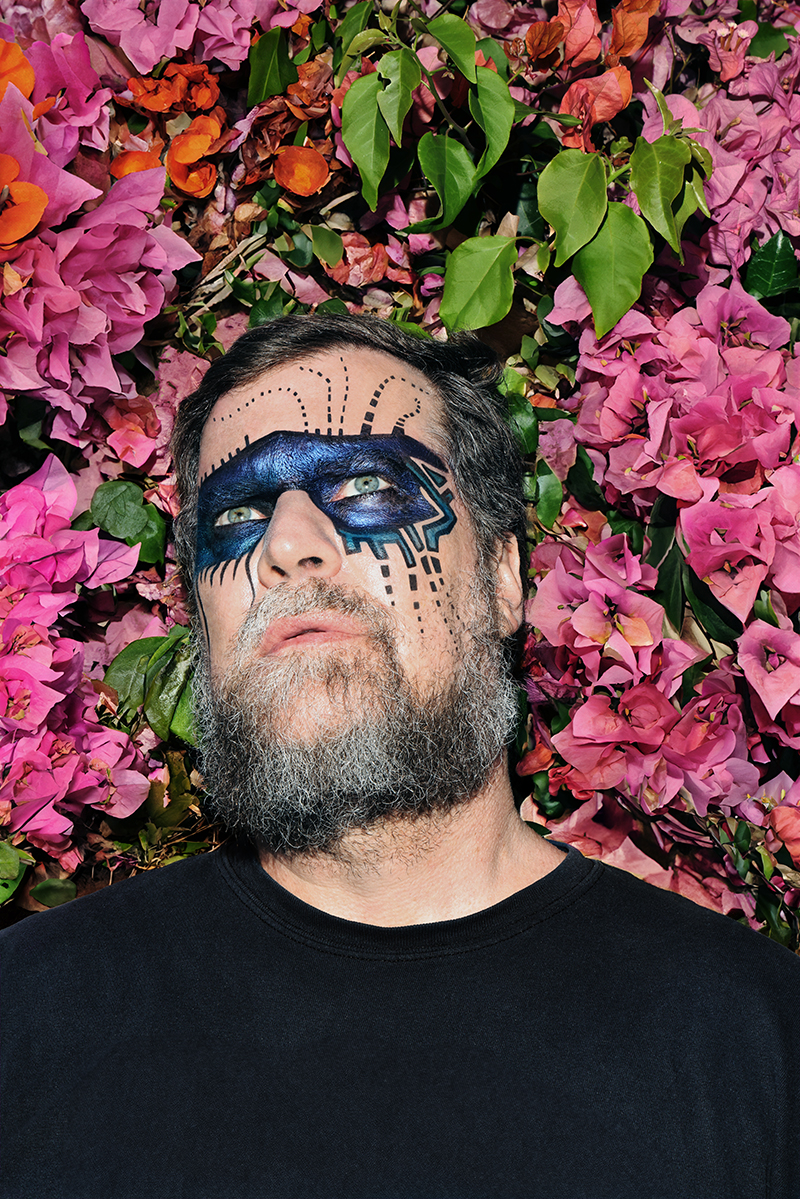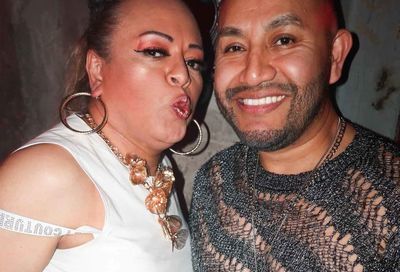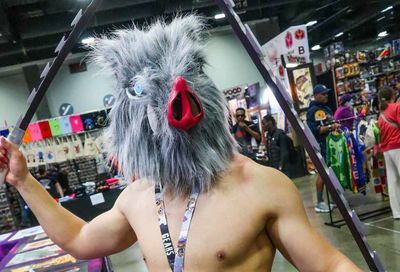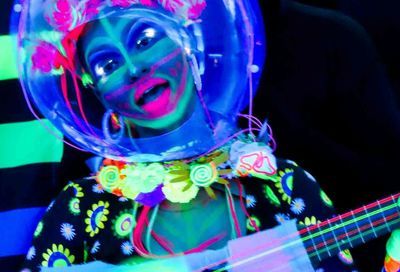Jazzman
Interview with composer-pianist Fred Hersch
My lovers suffocate me,
Crowding my lips, thick in the pores of my skin,
Jostling me through streets and public halls, coming naked to me at night,
Calling my name from flower-beds, vines, tangled underbrush,
Lighting on every moment of my life,
Noiselessly passing handfuls out of their hearts and giving them to be mine.
 |
Nineteenth-century poetry may not be the first place you’d think a modern-day jazz musician would look for inspiration. But it’s in the words of Walt Whitman, such as these from “Song of Myself,” that composer-pianist Fred Hersch found the artistic motivation for the most ambitious undertaking in his illustrious, 26-year career: Leaves of Grass, a full-length concert of Whitman-inspired music for eight instrumentalists and two vocalists.
Joining two-time Grammy nominee Hersch for a performance of Leaves of Grass at GWU’s Lisner Auditorium this Saturday, April 5, are vocalist Kurt Elling (also a multiple Grammy nominee), and 2001 BBC Jazz Vocalist of the Year Norma Winstone, as well as an international roster of acclaimed jazz instrumentalists.
“Whitman is one of the great iconic Americans — a self-invented person and a groundbreaker,” says the 47-year-old Hersch, who has established himself as one of the most prolific and widely-praised solo jazz pianists of his generation.
“I think a lot of people will assume that because I’m gay, I’m doing a gay thing with Whitman, which I’m not. That’s one of the reasons I wanted to have a female voice as well as a male voice, so it’s not just a guy thing. I didn’t want it to be like Hal Holbrook doing Mark Twain or something.”
Such easy comparisons aren’t likely for an artist such as Hersch, whose musical endeavors have long-defied simple description.
“I still have a classical piano teacher in New York,” Hersch says, “and I work with different classical artists as well. To me, it’s all music. I’m not one of these big people who’s bound by one genre or another. Primarily, I’m a jazz pianist, composer and improviser. But I do a lot of other things, too. It keeps it interesting.”
METRO WEEKLY: How do you tackle a project like Leaves of Grass?
FRED HERSCH: I just went from the words. The longest part of this process was selecting the text and putting them in an order that made some dramatic shape. In most cases, I didn’t use entire poems. A poem like “Song of Myself” is sixty pages to read — you can’t set anything that large. But I set parts of it. And I used some obscure poems. Everybody said, “Oh, it’s going to be all the gay poems,” but I didn’t use any of those. I didn’t use any of the New York poems. I didn’t use any of the Civil War poems. The libretto I’ve come up with is about universality, love, love of nature, love of all human beings — kind of that sense of wonder about life, along with some things about freedom. I’m not doing an anthology of Whitman’s greatest hits. This is my choice of what I wanted to say. I think it’s very timely, with everything going on in the world, to go back to some of these universal values — the preciousness of life and nature, and how we all need to be ourselves as much as possible and not be intimidated.
MW: What kind of audiences do you hope to draw?
HERSCH: I would hope that people who follow me, or who are interested in new music or things that are a little different, will be interested in this. It’s not a very wild, far-out piece. It ended up being very lyrical. I think it’s also a chance for people to hear some really unbelievably great playing. Putting together a band of this caliber has been a challenge, but worth it.
MW: How were you drawn to jazz initially, and how do you think new audiences are getting exposed to jazz today?
HERSCH: I’d always been an improviser, from the time I started playing the piano at age five or so. So, when I discovered jazz as a late teenager, it seemed like it was the best language that existed for improvisation. If you know the tunes and you learn the jazz language, you can play with lots of different musicians. In my career, which has been very diverse — all kinds of collaborations with people from the jazz world, and world music, and classical artists — jazz and improvisation has always been at the center. But, I also learned how to play jazz on bandstands. I’m a trained musician, but I didn’t go to school to learn how to play jazz. I learned how to play by playing it. That’s different now. Jazz education is a big thing, and jazz has become more institutionalized, which can be a good or bad thing. Like in Washington, years ago, I used to play at the One Step Down. Now, of course, that’s closed. It was kind of a dump, but it was great, because it provided touring musicians and local musicians chances to play together, and interact, and hang out. It’s a different experience than going to a concert at the Kennedy Center, which is great, too.
|
MW: Do you see the traditional jazz audience from year to year shrinking, holding steady, or growing?
HERSCH: I don’t like the word “traditional.” What I do is not traditional. It has roots in the tradition, but it’s creative. It’s not recreating a Duke Ellington performance from 1938. There’s a big repertory movement in jazz now. It’s not moving the music forward, or it’s not as personal. So instead of saying “traditional,” I’d say what I’m doing is acoustic, instrumental, creative music. I draw from a number of influences, and a number of different traditions — jazz, classical, Brazilian music, and who knows what else. I don’t know what the demographics are, but I know that there’s less jazz on the radio now nationwide. Many of the NPR stations and local public stations have drastically cut their jazz programming, because they’re all being run by people who use Arbitron ratings and want to keep their sponsors happy. Radio has been a vital link to, and a great way for people to learn about, jazz. Because you get a chance to sample this whole variety of artists and see what you like. Then hopefully you’ll be inspired to go to the record store and try some things.
MW: What size, would you estimate, is the gay audience for jazz?
HERSCH: People have asked me over the years why there’s such a small gay audience for jazz. Well, even just talking about gay males — assuming that one in ten is gay, which I think is generous — the record-buying public for jazz is about two percent. And of that two percent that’s considered jazz buyers, that also includes smooth jazz, which is not jazz — it’s instrumental pop music — and singers like Diana Krall or what have you. Creative instrumental jazz, of that two percent, is probably a very small portion, maybe a quarter of it. So you’re looking at twenty-five percent of two percent of ten percent — it’s not very many people. If most people say they’re into jazz, it usually means these days singers or smooth jazz.
Creative instrumental music is like the percentage of people in the classical music world who listen to new music — music of this century. It would also be a similarly small percentage. But those people like a challenge. Schubert is great, but they want to listen to the music that reflects their times.
MW: Has world music always been a factor in your musical development, or is that something you’ve picked up on with its upsurge in recent years?
HERSCH: Growing up in Cincinnati, there wasn’t world music. There were guys who played bossa nova, but that was about it. Of course, now we have access to all this great African pop music, and music from eastern Europe — music from all over the place. The musical community has gotten a lot more close and sophisticated in the last twenty years. Of course, living in New York, I have a chance to go hear so much great music from other countries. I’d say it’s certainly had a little more influence in the last ten years. I’ve been most influenced by the music of Brazil, because I’ve studied it the most, but I enjoy music from all over.
MW: Which musicians were you really turned on to when you were first listening to jazz?
HERSCH: In the beginning, I listened to all the usual suspects — Miles Davis, Mingus, Monk, Sonny Rollins, Coltrane, Ornette Coleman — you know, the great heroes. And I’ve spent some time listening to most of the great jazz musicians over the years. It’s all part of the soup. It all subconsciously enters your musical personality. It’s hard for me to talk about my own influences. Other people need to do that. Hopefully I sound like myself most of the time, and if people hear influences, it has to do with what their frame of reference is.
MW: Is being an openly gay musician in your field something you’ve been able to do for a long time?
HERSCH: Yeah. I mean, I was kind of a — maybe trailblazer is too strong — but certainly I was one of the first people in the jazz scene to come out in a big way. Anybody’s who’s known me since I was eighteen has known I’m gay. It’s not a big state secret. But in terms of really coming out big-time in the media and stuff, that was the early ’90s. And since I’ve done it, a lot of other people — well, at least a few people — have done it as well. They kind of checked me out as a guinea pig and said, “Well, it’s not hurting Fred’s career any.”
MW: What was it that made your coming-out a high-profile thing?
HERSCH: Well, I’d just gotten my first Grammy nomination, and I’d just released a benefit CD for Classical Action: Performing Arts Against AIDS, and I felt like it was time to talk about being positive and being gay. And it turned into like Newsweek, CNN, The Advocate, Fresh Air, and everything else — it was a media blitz. Not too many performing artists of any kind were out about having HIV, and certainly nobody in the jazz community was talking about being gay. I would say it was somewhat risky, but since then, my career has just gotten better and better every year. And I seem to stay healthy. As an artist, it made me less likely to give a shit what anybody else thinks. If you’re wasting energy about that, you’re not really having the energy to do what you need to do. That was a big thing for me.
MW: How tolerant was, and is, the jazz community of gay artists in the fold?
HERSCH: I’ve never experienced any direct homophobia. I’m sure people have said things behind my back, but I haven’t heard them. And people like my music, or they don’t. I mean, I play at the greatest jazz club in the world twice a year, and I pack the place, and nobody seems to care whether I’m gay or not. My boyfriend comes down to the club — it’s no big deal. It’s also New York City. I’m not living in some small town in Iowa. And I think that being gay, in 2003, is fundamentally not that interesting. You know, so tell me something new — so what? And that’s progress. It means that it’s become a non-issue. Some people wear contact lenses, some people wear glasses, some people have good eyesight — it’s about that interesting, really. And it doesn’t mean that the music I play is gay music. It just means that I’m a musician who happens to be gay, that’s all. I don’t think there’s a “gay sensibility.”
|
MW: Does sexuality drive any kinds of the artistic choices you make?
HERSCH: Not really. I mean, I did a CD of Cole Porter, and I’ve done a CD of Billy Strayhorn. Those are certainly big gay icons. But I wouldn’t have done them if they weren’t interesting music. I’m probably not likely to do a Sondheim record. It’s great, but it’s not the right thing for me. But if it was, I would do it. Right now, I’m interested more in playing things that I write, and continuing to challenge myself as a composer. That’s one of the main thrusts of where I am at the moment.
MW: How do you approach composition? What inspires you, and what is the process of getting a musical thought down?
HERSCH: It’s different in every case. Sometimes I’m inspired by a musical element, sometimes I’m inspired by a word, or a mood, or a rhythm. Everything I write — every tune, or whatever — I’d like to think that they all came from their own different little place. You don’t want to keep writing the same thing over and over. Sometimes, they’ll come from just sitting and improvising, and something will strike me. Sometimes I set out and make myself a little assignment to write this kind of a piece, and then the wheels start going, and then hopefully something pops out. But it’s idiosyncratic — it just keeps changing. I don’t have an approach. It’s always different.
MW: Have you ever been inspired by very serious things — any kinds of crises in your life or the world?
HERSCH: Sure. I wrote a piece that was a reaction to the Matthew Shepard thing, and I wrote a song for the AIDS Quilt Songbook. So certainly I’ve been inspired by social things, and things going on in the world, and things that hit me personally. But the bottom line is that they’re music. If you didn’t know that piece was about Matthew Shepard, you might find it haunting. But I don’t believe in doing things literally. It’s a musical response to something.
MW: Have you always been able to work full-time as a musician?
HERSCH: Yes, I’ve never had a day job. I moved to New York in 1977, after I got out of music school, so I’ve been there almost twenty-six years. Of course, I’ve seen tremendous changes in the city, and I’ve seen tremendous changes in the jazz scene. But it’s still where I live, and it’s still the center. New York is a great place in that there are always possibilities. There’s a possibility you’re going to stumble out and hear something that’s really interesting, or you’ll get a phone call from somebody and end up making some music that might change the direction of your music-making. I don’t love a lot of things that have happened in New York, but it seems like the right place for me to be right now.
MW: Is a jazz career any harder or easier at this point in your life, considering how established you are, but also that jazz is changing?
HERSCH: Well, jazz musicians are pretty much underpaid. If I were to compare myself to a classical pianist of a similar career profile, they would probably make much more money than I do. But I have more fun. You make your choices. As long as I can keep it going, and have money to do the things I need, and can go out to dinner, and take a vacation now and then, that’s fine. If I wanted to really have made a lot money in music, I would have made different choices. But these are the choices I’ve made. I don’t play music that I don’t want to play, and I don’t have to answer to anybody. That’s what’s important to me — the freedom to do things that interest me.
The Fred Hersch Ensemble will perform Leaves of Grass at 8 p.m. on Saturday, April 5, at Lisner Auditorium, 730 21st Street NW on the campus of The George Washington University. Tickets are $20 to $30. Call 202-994-6800. Visit www.lisner.org.
Support Metro Weekly’s Journalism
These are challenging times for news organizations. And yet it’s crucial we stay active and provide vital resources and information to both our local readers and the world. So won’t you please take a moment and consider supporting Metro Weekly with a membership? For as little as $5 a month, you can help ensure Metro Weekly magazine and MetroWeekly.com remain free, viable resources as we provide the best, most diverse, culturally-resonant LGBTQ coverage in both the D.C. region and around the world. Memberships come with exclusive perks and discounts, your own personal digital delivery of each week’s magazine (and an archive), access to our Member's Lounge when it launches this fall, and exclusive members-only items like Metro Weekly Membership Mugs and Tote Bags! Check out all our membership levels here and please join us today!





















